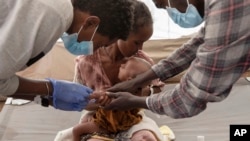The authorities in Ethiopia's war-scarred Tigray region warned Friday of a looming famine linked to drought and the lingering effects of the devastating two-year war in the north of the country.
Getachew Reda, president of the interim regional authority in Tigray, said more than 91% of the population was "exposed to the risk of starvation and death" and called for the Ethiopian government and international community to help.
In a statement posted on X, formerly known as Twitter, Getachew likened the situation to the Ethiopian famine in the 1980s, which cost the lives of around 1 million people.
"Since the signing of the Pretoria agreement, thousands of Tigrayans have perished due to lack of food," Getachew said, referring to the November 2022 peace deal that ended the war between Tigrayan rebels and Ethiopian government forces.
The situation on the ground in northern Ethiopia cannot be independently verified as media access to Tigray is restricted by the federal government.
Getachew said Tigray's interim administration had declared a disaster emergency in areas under its control but had limited resources to handle the crisis.
"The Ethiopian government and the international community have done their part to silence the guns. Now they should do their part to address the looming humanitarian catastrophe," he said.
Getachew highlighted the devastating consequences of the conflict, including economic crisis, mass displacement and destruction of health facilities, combined with the shortage of seasonal rains followed by destructive rainfall, as well as locust invasions.
He said the temporary suspension of aid earlier this year by the United States and the U.N.'s World Food Program, or WFP, had also played a role in the crisis.
USAID and the WFP halted all food aid to Ethiopia in June, alleging a "widespread and coordinated" campaign to divert donated supplies, but deliveries are slowly resuming.
"Although aid has since been restored on a limited basis, the amount of aid reaching the needy is a fraction of what is necessary to meet current requirements," Getachew said.
In a statement published on December 22, the U.N.'s humanitarian response agency OCHA said, "The drought situation is worsening in some parts of northern, southern and southeastern Ethiopia and is expected to deteriorate further unless aid is urgently scaled up."
It said the food security situation covering the October 2023-May 2024 period in Tigray is likely to deteriorate, while some populations, particularly those displaced, will experience severe food insecurity, according to the global Famine Early Warning Systems Network.
